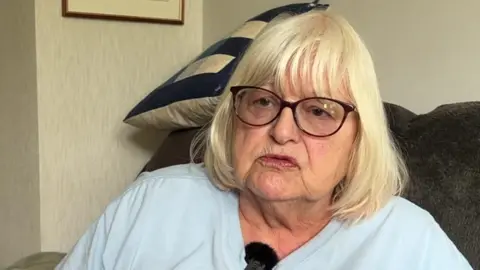[ad_1]
 Jenny Sexton
Jenny SextonA woman has been told she could soon be separated from her husband by miles of sea so he can receive care for his dementia.
David Sexton, 86, was moved into a care home in Ryde on the Isle of Wight in January.
When his condition worsened, the local authority told his wife, Jenny, he needed a higher level of care – but that there were “no places suitable” on the island.
Mrs Sexton said she was “very upset” and that moving her husband to the mainland would mean she could not visit him.

Mr Sexton was taken to St Mary’s Hospital with gastroenteritis at the beginning of September.
When he was ready to be discharged, the care home he had been living in claimed his needs had become too complex for him to return.
He needed a room in a nursing home, but Mrs Sexton said Isle of Wight Council’s adult social care team were considering moving him off the island and to “somewhere on the south coast”.
The couple, who have been married for 34 years, have both lived on the island for their entire lives.

If moved to the mainland, Mrs Sexton said she would only be able to visit her husband twice a month because of ferry costs and her own mobility issues.
“It will kill me. It will devastate me not to be able to see him, to be able to reassure him that I’m around still,” she said.
Without regular visiting, Mrs Sexton worries her husband’s condition will worsen.
“I think he would have a gradual decline, which is not what I want for him,” she said.
“I want him to be comfortable, to be happy and to be able to see me.”

By 2030, there are expected to be just under 4,000 people with dementia living on the Isle of Wight, sparking concerns among some residents.
An Isle of Wight Council spokesperson said the authority would always work to secure the care and support required to meet people’s individual needs.
“This can, on occasion, lead to discussions with people about accessing care and support off island,” they said.
They added they were unable to comment on individual cases.
The Isle of Wight NHS Trust has been approached for comment.
If you have been affected by the topic discussed in this article, support is available via the BBC Action Line.
[ad_2]
Source link




